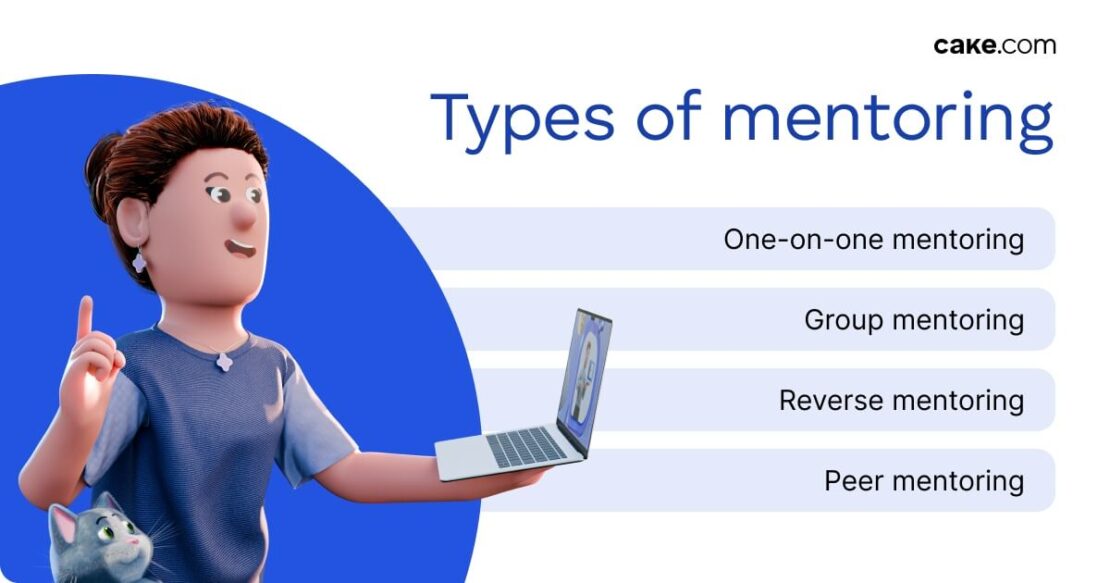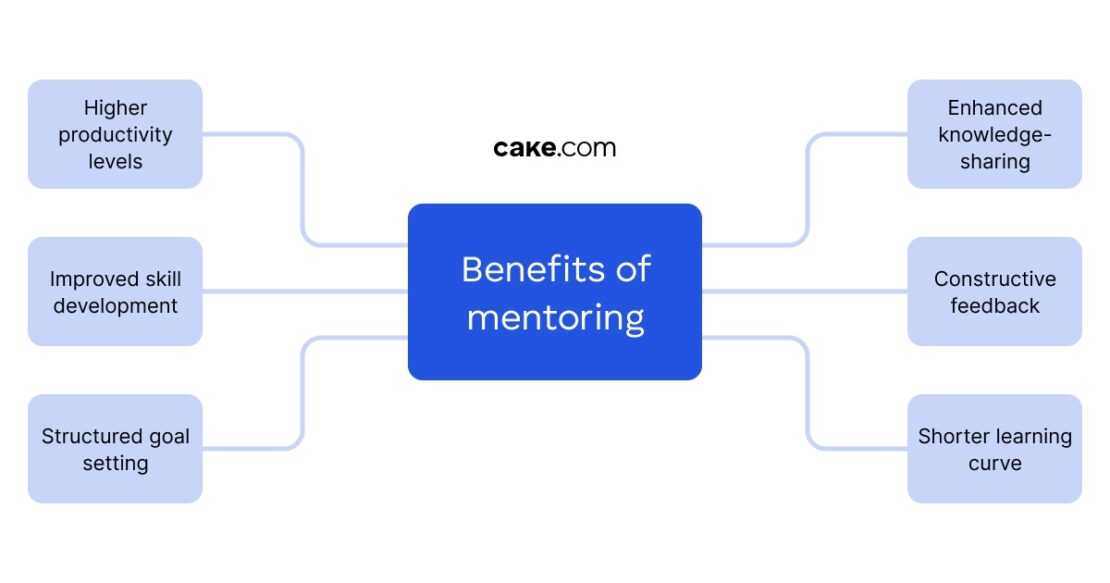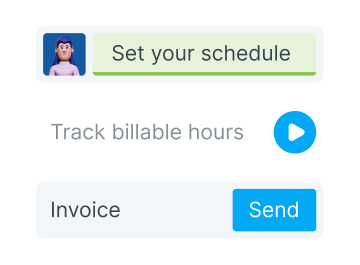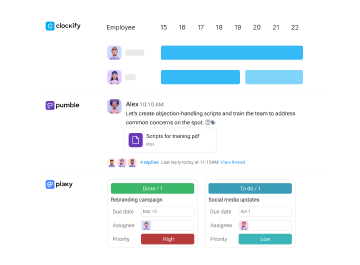Are you looking for ways to increase productivity at your company, and you’re not impressed with the latest productivity methods?
Perhaps now’s the time to change your approach and introduce mentoring programs to your employees.
The idea is to have more seasoned colleagues helping less experienced ones navigate through different phases of work. Results are often sparkling, with benefits arising for both sides — the mentor and the mentee.
This blog post will introduce you to the notion of mentorship, its importance, and the benefits it has when it comes to productivity.
- 98% of Fortune 500 companies now offer mentoring programs.
- Mentorship increases job satisfaction and enhances career advancement.
- Mentorship programs are a unique way to transfer tacit knowledge among employees.
- Mentoring shortens the learning curve due to the guidance mentees receive.
What exactly is mentorship at work?
Mentorship at work can take many forms, and each one of them has a positive impact on productivity. Executive Career & Leadership Coach Kara Denisson writes about different mentorship types in a Forbes article, and we bring you the most common ones:
- One-on-one mentoring — is a type of mentoring where an experienced employee works closely with a mentee, helping them overcome challenges at work and advance their career,
- Group mentoring — is one of the possible mentoring programs where one senior employee is mentoring a group of employees, usually new hires,
- Reverse mentoring — as the name suggests, the mentoring process is reversed — a younger employee is mentoring the experienced one — with the aim of both learning new skills and acquiring knowledge, and
- Peer mentoring — is a process where two employees are approximately the same age or experience level, and provide guidance to each other.
You can incorporate any mentoring type that you feel suits your company best.
Further reading:
Reverse mentoring is a great way to overcome generational differences at work. Read tips on how to do it smoothly:

Why is mentorship important?
But why is mentorship important, you may ask?
A job coaching expert Kate Broeking emphasizes the need to implement mentoring programs at work:

“Every company should offer some form of mentorship or coaching program, especially if they care about employee development. Mentorship builds confidence and helps employees navigate day-to-day challenges — challenges that are often due to unspoken norms or expectations.”
Benefits of mentoring in the workplace
According to the mentorcliQ 2024 Mentoring Impact Report, 98% of Fortune 500 companies now offer mentoring programs due to the possible benefits.
The advantages of offering mentorship at work are countless, and we’ll single out the most important ones related to productivity.
Mentors help increase productivity
Broeking reveals that employees can often feel stuck performing their tasks:

“You’d be surprised at how often employees get stuck at work — it’s easy to freeze when you come across a problem you haven’t seen before or to put off overwhelming tasks.”
Broeking points out that having a mentor is an ideal solution in these situations:

“By giving employees a trusted, safe person they can go to, their productivity can increase tenfold. A mentor helps an employee get unblocked and gives them a safe place to seek help without fear of being penalized for it.”
The direct result of higher productivity levels is more profit. According to the same mentocliQ research, companies that offer mentoring programs have 2x more profit than those that don’t. The same study found that mentoring is a reliable way to combat quiet quitting at work.
Further reading:
Speaking of productivity, science offers some marvelous solutions when it comes to wiring our brains to be more productive. Check them out:

Mentors assist in skill development
When mentors and mentees work closely together on a clearly defined goal, mentees can develop their skills faster.
Executive and strategic advisor Raquel Braun shares how mentorship enhances skills development:

“Mentors have institutional knowledge that they can share with their mentees to help them learn and implement best practices more efficiently. They’re able to provide real-time feedback and introduce new tools or approaches to their mentee that allow them to improve their skills and accelerate their professional growth.”
But, it’s not only mentees that benefit from improved skills development, it’s also the mentors. They practise and improve their leadership skills, deepen their subject knowledge, and regain interest in work as well.
Mentors aid in goal setting, along with managers
Knowing what you should work on is one of the few shortcuts to success. Just like managers, mentors can pinpoint your strengths and weaknesses and help you define goals based on that.
For example, goals should always be SMART, meaning:
- Specific,
- Measurable,
- Attainable,
- Relevant, and
- Time-bound.
Let’s say an employee working in sales doesn’t make enough sales to earn a monthly bonus.
With the manager and mentor, they set a goal to earn the first bonus within 3 months.
The goal is relevant (the company will benefit from successful sales) and time-bound (3 months).
It’s also measurable and specific (conditions for receiving a bonus are well-defined in sales teams, and the success is measured in the amount of bonus received), and attainable (the employee will have support and guidance from the mentor at all times).
Another reason why mentorship is important when it comes to goals is that employees are more likely to work on accomplishing them when they have a mentor.
Positive psychologist Dr. Kiki Ramsey explains how working with a mentor can change your mindset:

“Their presence creates a sense of accountability, encouraging you to stay on track with your goals. There is also an added drive to complete your tasks, not just for yourself but to make your mentor proud.”

Mentors promote knowledge sharing at work
Do you know what tacit knowledge is? It’s the kind of knowledge that is gathered through years of experience, and often cannot be found in manuals or company’s documents. Yet, it’s crucial for solving and foreseeing issues at work.
Luckily, this kind of knowledge is best transferred in mentorship programs, when an experienced employee shares their insights, as well as tips and tricks, with the mentee.
A recent Pryon report reveals that 47% of professionals spend 1-5 hours searching for the right information. But mentors can guide mentees as to how and where to look for the data they need in the best way possible — thus creating a knowledge-sharing workplace culture.
Further reading:
Efficient knowledge management can propel productivity to the next level. Read all about the current KM state in the following statistics:
Mentors provide constructive feedback
Employees are sometimes reluctant to ask their manager for feedback.
But mentoring relationships function differently. The mentor is present throughout the day and is paying close attention to what the mentee is doing. So, specific, constructive, and timely feedback comes naturally.
Braun explains the subtle art of mentors providing feedback:

“The key is framing the feedback in a way that allows a mentee to reflect, apply improvements, and experience the results of implementing such changes.”
And vice versa, the mentee can provide feedback to the mentor if they spot gaps in knowledge or technology used. This strengthens leadership skills in both mentor and mentee.
Further reading:
Learn how to construct feedback that is straight to the point and most helpful to your colleagues:
Mentors shorten the learning curve
Why is mentorship important when it comes to the learning curve? It’s all about how the mentees feel — with proper guidance, they’re not afraid of making mistakes, and they’re picking up new data with more ease.
Founder of Local SEO Help Lonnie Jones explains exactly how mentorship speeds up the learning process:

“Mentorship shortens the learning curve. When employees have direct access to someone who’s already solved the challenges they’re facing, it reduces trial-and-error scenarios, speeds up decision-making, and builds confidence. That leads to quicker execution and fewer mistakes.”
How long should the mentorship at work last?
CEO and mentor Iqbal Ahmad claims that mentorship programs should last at least 3 months presuming there’s a desire to succeed and the feeling of trust in the process:

“In my experience, a consistent 12-week or even extended to six months structured mentorship program often leads to fruitful outcomes.”
On the other hand, an engineering manager and experienced mentor Ilija Eftimov points out that setting clear mentorship goals directly impacts how long the mentorship should last:

“I have seen even a single mentorship session bring results and improvements with the mentee. I have also witnessed months of mentorship without results.”
Mentorship is a fantastic productivity asset for your company
Mentoring programs are flexible — you can define their duration and choose the type of program that suits you best. Then, all you have to do is monitor the success it has with your employees.
Jones concludes that mentorship is another (even better) form of a guidebook:

“I’ve seen it first hand and mentorship creates alignment, increases performance, and turns good employees into high achievers faster than any training manual.”
If you haven’t done it already, try to integrate a mentorship program at your workplace to increase productivity levels, team collaboration, and skill development among employees.
How we reviewed this post: Our writers & editors monitor the posts and update them when new information becomes available, to keep them fresh and relevant.






